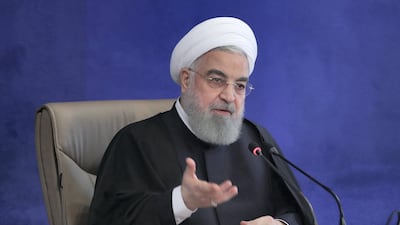Iran’s announcement to intensify its nuclear programme was condemned as “deeply worrying” by the three major European powers.
France, Germany and Britain expressed “great concern” that the Iranian parliament had voted to expand its nuclear ambitions and to limit access by inspectors from the International Atomic Energy Agency (IAEA).
The statement comes at a time when European countries are hoping that with Joe Biden becoming US president, America would re-enter the deal from which President Donald Trump withdrew.
There is a suggestion that if the president-elect lifts all sanctions on Iran then the country would agree to return to full compliance in the nuclear deal. However, this cannot be negotiated officially until Mr Biden is sworn in next month.
In the meantime, the European powers, known as the E3, issued the strongly worded statement saying that they had “worked tirelessly to preserve” the deal to ensure Iran’s nuclear programme was for purely peaceful means, being used for energy rather than to build a nuclear bomb.
However, there are now considerable doubts over Tehran’s willingness to comply with the deal.
“Iran’s recent announcement to the IAEA that it intends to install an additional three cascades of advanced centrifuges at the fuel enrichment plant in Natanz is contrary to the [deal] and deeply worrying,” the E3 said.
“Furthermore, we have taken note, with great concern, of the recent law passed by the Iranian Parliament, which – if implemented – would substantially expand Iran’s nuclear programme and limit IAEA monitoring access. The measures would be incompatible with the [deal] and Iran’s wider nuclear commitments.”
Javad Zarif, Iran’s foreign minister, claimed last week that his government was uncomfortable with the Iranian parliament’s resolution to increase its uranium enrichment and to end the UN inspection programme by February if sanctions are not lifted.
Mr Zarif said that, like any democracy, the laws passed by parliament placed “an obligation on the government”. But, he said, the resolution was “not irreversible” and would no longer be in effect if the US lifted the trade sanctions.
The E3 said if Iran was “serious about preserving a space for diplomacy” then it must not implement the parliament ruling on enhancing the nuclear programme and banning inspectors. This also risked “compromising the important opportunity for a return to diplomacy with the incoming US administration”.
It said a return to the nuclear deal "would also be beneficial for Iran".
Mr Zarif appeared to rule out renegotiating the existing deal, however. "The US must implement without preconditions its obligations under the [deal]," he said last week.
“It has to show its good faith, it has to establish its bona fides, then Iran will go back in full compliance [with the deal. We will not renegotiate a deal which we negotiated.”
The E3 concluded it would address Iran's non-compliance with the framework of the deal and would also welcome a statement from Mr Biden on the deal and how he intends to deal with Iran.


